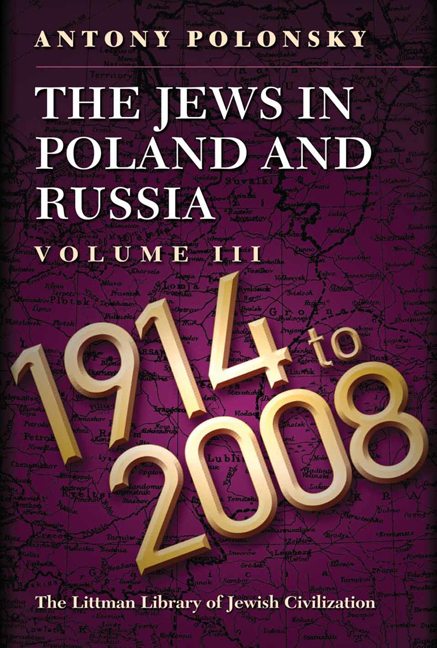Book contents
- Frontmatter
- Dedication
- Acknowledgements
- Contents
- List of Maps
- List of Tables
- Note on Transliteration
- Note on Place Names
- Maps
- General Introduction
- PART I FROM THE FIRST WORLD WAR TO THE SECOND
- PART II WAR AND GENOCIDE, 1939–1944
- PART III FROM THE END OF THE SECOND WORLD WAR TO THE COLLAPSE OF THE COMMUNIST SYSTEM
- EPILOGUE JEWS IN EASTERN EUROPE AND RUSSIA SINCE THE END OF COMMUNISM
- Conclusion
- Glossary
- Bibliography
- Index
14 - The Soviet Government and the Holocaust
- Frontmatter
- Dedication
- Acknowledgements
- Contents
- List of Maps
- List of Tables
- Note on Transliteration
- Note on Place Names
- Maps
- General Introduction
- PART I FROM THE FIRST WORLD WAR TO THE SECOND
- PART II WAR AND GENOCIDE, 1939–1944
- PART III FROM THE END OF THE SECOND WORLD WAR TO THE COLLAPSE OF THE COMMUNIST SYSTEM
- EPILOGUE JEWS IN EASTERN EUROPE AND RUSSIA SINCE THE END OF COMMUNISM
- Conclusion
- Glossary
- Bibliography
- Index
Summary
Along with all the citizens of our great country, our sons are engaged in battle, dedicating their lives and blood to the great patriotic war of liberation being waged by the Soviet people.
Our mothers themselves are sending their sons into this battle for justice, for the great cause of our free Soviet homeland.
Our fathers are fighting alongside their sons and brothers against the enemy, who is ravaging and annihilating the people.
And you, our brothers, remember that here in our country, on the battlefields, your fate as well as the fate of the countries you live in is being decided. Don't be lulled by the thought that Hitler's brutal savagery will spare you.
SHLOMO MIKHOELS, broadcast to the Jews of the world, 24 August 1941THE STUDY OF THE HOLOCAUST in the USSR has until recent years been somewhat neglected, and in the cold war years was bedevilled by politics. The Soviets downplayed the specifically Jewish features of the Holocaust, stressing the common fate of the peoples of the USSR, while Western scholarship was eager to document the long-standing hostility of Stalin to Jews and the Jewish people. It is only with the opening of the archives of the states of the former Soviet Union that the subject has been placed on a proper academic footing. Yet it is clear that it is central to a proper understanding of the Holocaust. It was the Soviets who played probably the largest role in the defeat of the Nazis, while after the annexations of 1939–40 the Jewish community of the USSR, with a population of nearly 5.3 million, was the largest in the world after that of the United States.
The attitude of the Soviet government to the anti-Jewish genocide is complex. At one level, communism was the complete antithesis of Nazism and the Nazi– Soviet conflict lay at the heart of the Second World War. Soviet foreign policy for much of the 1930s seemed to be dominated by its opposition to fascism and above all its German embodiment. There were some ambiguities in this support. Thus, Soviet backing for the Popular Front in Spain was ambivalent and half-hearted, while fear of foreigners at the height of Stalinism meant that attempts by inter - national Jewish organizations to settle Jewish refugees in Birobidzhan were rebuffed.
- Type
- Chapter
- Information
- The Jews in Poland and RussiaVolume III: 1914 to 2008, pp. 563 - 588Publisher: Liverpool University PressPrint publication year: 2012



